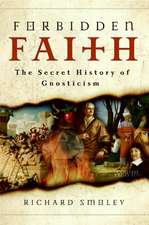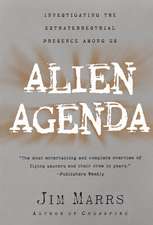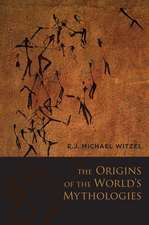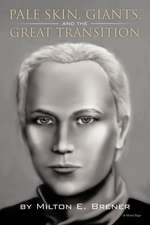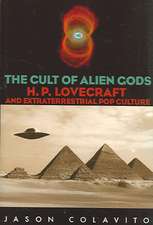Denial: Self-Deception, False Beliefs, and the Origins of the Human Mind
Autor Ajit Varki, Danny Broweren Limba Engleză Hardback – 3 iun 2013
At a chance meeting in 2005, Brower, a geneticist, posed an unusual idea to Varki that he believed could explain the origins of human uniqueness among the world's species: Why is there no humanlike elephant or humanlike dolphin, despite millions of years of evolutionary opportunity? Why is it that humans alone can understand the minds of others?
Haunted by their encounter, Varki tried years later to contact Brower only to discover that he had died unexpectedly. Inspired by an incomplete manuscript Brower left behind, DENIAL presents a radical new theory on the origins of our species. It was not, the authors argue, a biological leap that set humanity apart from other species, but a psychological one: namely, the uniquely human ability to deny reality in the face of inarguable evidence-including the willful ignorance of our own inevitable deaths.
The awareness of our own mortality could have caused anxieties that resulted in our avoiding the risks of competing to procreate-an evolutionary dead-end. Humans therefore needed to evolve a mechanism for overcoming this hurdle: the denial of reality.
As a consequence of this evolutionary quirk we now deny any aspects of reality that are not to our liking-we smoke cigarettes, eat unhealthy foods, and avoid exercise, knowing these habits are a prescription for an early death. And so what has worked to establish our species could be our undoing if we continue to deny the consequences of unrealistic approaches to everything from personal health to financial risk-taking to climate change. On the other hand reality-denial affords us many valuable attributes, such as optimism, confidence, and courage in the face of long odds.
Presented in homage to Brower's original thinking, DENIAL offers a powerful warning about the dangers inherent in our remarkable ability to ignore reality-a gift that will either lead to our downfall, or continue to be our greatest asset.
Preț: 253.23 lei
Nou
Puncte Express: 380
Preț estimativ în valută:
48.45€ • 50.59$ • 40.10£
48.45€ • 50.59$ • 40.10£
Carte disponibilă
Livrare economică 15-29 martie
Preluare comenzi: 021 569.72.76
Specificații
ISBN-13: 9781455511914
ISBN-10: 1455511919
Pagini: 384
Dimensiuni: 165 x 241 x 32 mm
Greutate: 0.66 kg
Editura: Grand Central Publishing
Colecția Twelve
ISBN-10: 1455511919
Pagini: 384
Dimensiuni: 165 x 241 x 32 mm
Greutate: 0.66 kg
Editura: Grand Central Publishing
Colecția Twelve
Notă biografică
Ajit
Varkiis
a
physician-scientist
who
is
currently
Distinguished
Professor
of
Medicine
and
Cellular
and
Molecular
Medicine,
Associate
Dean
for
Physician-scientist
Training,
Co-director
of
the
Glycobiology
Research
and
Training
Center
at
the
University
of
California,
San
Diego
(UCSD),
and
co-director
of
the
UCSD/Salk
Center
for
Academic
Research
and
Training
in
Anthropogeny.
Danny
Brower,
an
insect
geneticist,
was
Professor
and
Chair
of
Molecular
and
Cellular
Biology
at
the
University
of
Arizona
in
Tucson.
He
died
in
2007.
Recenzii
"This
is
perhaps
the
most
exciting
idea
in
evolution
that
I
have
read
since
Darwin.
Danny
Brower's
manuscript
survived
his
untimely
death
and
how
it
came
to
Ajit
Varki's
hands
is
an
evolutionary
story
in
itself.
Varki
is
a
renowned
physician-scientist,
and
what
Ajit
is
doing
is
to
take
this
manuscript
and
reworking
it,
producing
a
work
of
beauty
and
simplicity.
It
is
the
tale
of
the
very
thing
that
makes
us
human.
A
marvel."—Abraham
Verghese,
Author
of
Cutting
for
Stone
"Groundbreaking new ideas often come from the most unexpected sources. Here is such an instance, wherein two scholars from disparate disciplines unrelated to human origins have come up with a completely novel theory--to explain one of the most fundamental of human questions: where did we humans come from, and how did we get here? A must read for anyone interested in this age-old quest."—Peter Agre, Nobel Prize in Chemistry, Johns Hopkins Bloomberg School of Public Health
"A highly readable manifesto for anthropogeny (the study of human origins),DENIALis written in a lively and engaging style that communicates the excitement of asking the big questions: how are humans different from all other species, and why did other species not evolve a full theory of mind, given the wide-ranging benefits that this brings to humans? Issuing a provocative challenge to future scientists, Ajit Varki's scholarly journey leads him to speculate about the role of our awareness of our mortality, and our simultaneous tendency to live in denial of it."—Simon Baron-Cohen, director, Autism Research Centre, Cambridge University
"This book answers the never-ending quest of what sets our species apart with a delightful suggestion. It is not so much our awareness of mortality that is special, the authors claim, but rather our ability to push this awareness to the farthest recesses of our minds. The ostrich has nothing on us."—Frans de Waal, author of The Bonobo and the Atheist
"Quite a book, with a revolutionary point of view that I find critically interesting. An enormous effort--an intriguing message and a major contribution."—Roger Guillemin, winner of the Nobel Prize in Medicine
"A tremendously engaging story-full of human interest, wit, scientific detective work, and imaginative speculation. It's great to see Varki and Brower pushing the limits. It makes us fellow-travellers into the field of the known unknowns."—Nicholas Humphrey, Author of Soul Dust and The Mind Made Flesh
"I foundDENIALintriguing at first, while perusing it. It soon became fascinating as I started to read it in earnest. I have long held that once they acquired the advanced intelligence characteristic of Homo sapiens, our ancestors became aware of their mortality. Anxiety about death leads to belief in the afterlife and other religious and ethical tenets. That is what I had learned from philosophers, theologians, and others.DENIALturns these ideas on their head.DENIALforcefully argues that it was awareness of mortality and its ensuing denial that prompted the evolution of our exalted intelligence. Original, engaging, and beautifully written."—Francisco J. Ayala, University Professor and Donald Bren Professor of Biological Sciences at the University of California, Irvine; recipient of the National Medal of Science and the Templeton Prize, author of The Big Questions: Evolution
"A magnificent scholarly work, both in terms of the science and the manner in which Varki has ethically tackled a gigantic path opened up by Brower. Wherever one dips into it, one gets involved almost immediately in some fascinating question. A superb book."—Derek Denton FRS, University of Melbourne, author of Primordial Emotions
"Engaging and intellectually exciting. Almost as fascinating as the novel ideas of Brower on the evolutionary origins of a distinctly human consciousness is Varki's story of how he stumbled upon them, and became preoccupied with their potentially profound implications about what differentiates humans."—Sanjay Nigam, author ofSnake CharmerandTransplanted Man
"A surprising and stimulating book that explores a deep insight into those psychological innovations that make us human."—Peter Lawrence, Cambridge University, Darwin Medalist of the Royal Society
"A gifted scientist with an encompassing humanitarian vision, Ajit Varki suggests that our blithe but false supposition that we will just go on living, day after day, is an evolutionary adaptation--one that has played a crucial role in the evolution of the human brain. Clear, cogent and compelling, DENIAL makes you ponder our habitual death-denial and why it is so robust. Does this hypothesis convince me? I am constitutionally a tough sell, especially when it comes to big ideas. Still, I do take this one very seriously. The more I kick its tires, the more sturdy it seems."—Patricia Smith Churchland, MacArthur Fellow, University of California Presidential Professor of Philosophy, author of Braintrust: What Neuroscience Tells us About Morality
"Groundbreaking new ideas often come from the most unexpected sources. Here is such an instance, wherein two scholars from disparate disciplines unrelated to human origins have come up with a completely novel theory--to explain one of the most fundamental of human questions: where did we humans come from, and how did we get here? A must read for anyone interested in this age-old quest."—Peter Agre, Nobel Prize in Chemistry, Johns Hopkins Bloomberg School of Public Health
"A highly readable manifesto for anthropogeny (the study of human origins),DENIALis written in a lively and engaging style that communicates the excitement of asking the big questions: how are humans different from all other species, and why did other species not evolve a full theory of mind, given the wide-ranging benefits that this brings to humans? Issuing a provocative challenge to future scientists, Ajit Varki's scholarly journey leads him to speculate about the role of our awareness of our mortality, and our simultaneous tendency to live in denial of it."—Simon Baron-Cohen, director, Autism Research Centre, Cambridge University
"This book answers the never-ending quest of what sets our species apart with a delightful suggestion. It is not so much our awareness of mortality that is special, the authors claim, but rather our ability to push this awareness to the farthest recesses of our minds. The ostrich has nothing on us."—Frans de Waal, author of The Bonobo and the Atheist
"Quite a book, with a revolutionary point of view that I find critically interesting. An enormous effort--an intriguing message and a major contribution."—Roger Guillemin, winner of the Nobel Prize in Medicine
"A tremendously engaging story-full of human interest, wit, scientific detective work, and imaginative speculation. It's great to see Varki and Brower pushing the limits. It makes us fellow-travellers into the field of the known unknowns."—Nicholas Humphrey, Author of Soul Dust and The Mind Made Flesh
"I foundDENIALintriguing at first, while perusing it. It soon became fascinating as I started to read it in earnest. I have long held that once they acquired the advanced intelligence characteristic of Homo sapiens, our ancestors became aware of their mortality. Anxiety about death leads to belief in the afterlife and other religious and ethical tenets. That is what I had learned from philosophers, theologians, and others.DENIALturns these ideas on their head.DENIALforcefully argues that it was awareness of mortality and its ensuing denial that prompted the evolution of our exalted intelligence. Original, engaging, and beautifully written."—Francisco J. Ayala, University Professor and Donald Bren Professor of Biological Sciences at the University of California, Irvine; recipient of the National Medal of Science and the Templeton Prize, author of The Big Questions: Evolution
"A magnificent scholarly work, both in terms of the science and the manner in which Varki has ethically tackled a gigantic path opened up by Brower. Wherever one dips into it, one gets involved almost immediately in some fascinating question. A superb book."—Derek Denton FRS, University of Melbourne, author of Primordial Emotions
"Engaging and intellectually exciting. Almost as fascinating as the novel ideas of Brower on the evolutionary origins of a distinctly human consciousness is Varki's story of how he stumbled upon them, and became preoccupied with their potentially profound implications about what differentiates humans."—Sanjay Nigam, author ofSnake CharmerandTransplanted Man
"A surprising and stimulating book that explores a deep insight into those psychological innovations that make us human."—Peter Lawrence, Cambridge University, Darwin Medalist of the Royal Society
"A gifted scientist with an encompassing humanitarian vision, Ajit Varki suggests that our blithe but false supposition that we will just go on living, day after day, is an evolutionary adaptation--one that has played a crucial role in the evolution of the human brain. Clear, cogent and compelling, DENIAL makes you ponder our habitual death-denial and why it is so robust. Does this hypothesis convince me? I am constitutionally a tough sell, especially when it comes to big ideas. Still, I do take this one very seriously. The more I kick its tires, the more sturdy it seems."—Patricia Smith Churchland, MacArthur Fellow, University of California Presidential Professor of Philosophy, author of Braintrust: What Neuroscience Tells us About Morality

